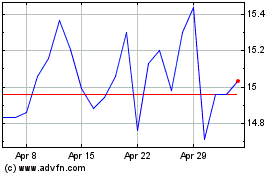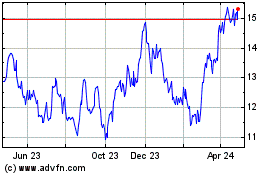Europe's Refiners Seek Partners As Euro Zone Credit Woes Bite
January 05 2012 - 12:06PM
Dow Jones News
Europe's struggling independent oil refiners risk following in
the footsteps of Petroplus Holdings AG (PPHN.EB) unless they team
up with oil companies, traders or investment banks to guarantee
crude supplies as the euro zone crisis has made it more expensive
to buy crude and further reduced already dwindling profits, traders
and analysts said.
Shares in Switzerland-based Petroplus fell 26% Thursday after it
said access to all the credit lines under its revolving credit
facility has been suspended. The company, which is now on the verge
of bankruptcy, said it is temporarily shutting down three of its
five refineries as it doesn't have enough crude oil to maintain
output.
To add to refiners' nervousness, Fitch Ratings said in a note
earlier this week that European banks, already suffering from the
euro zone sovereign debt crisis, are likely to limit the amount of
credit they provide to refiners this year. Any withdrawal of credit
will have the biggest impact on independent refiners.
The higher cost in financing crude purchases comes at a bad time
for European refiners that are already suffering from weak profit
margins amid high crude oil prices, weak products demand and
competition from more advanced refineries in Asia and the Middle
East.
Although Europe's independent refiners represent only around a
third of the region's refining capacity, the loss of these
companies could tighten products markets and lead to higher prices
for consumers.
"The euro zone crisis makes the situation for independent
refiners very difficult--I wouldn't say it's the last nail in the
coffin, but it's definitely one more," said Roy Jordan, downstream
consultant at Facts Global Energy.
Unlike refineries owned by integrated oil companies, such as BP
(BP) or Lukoil Holding (LKOH.RS), independents don't have the
luxury of guaranteed crude supplies as lending conditions worsen,
or the easy access to cheaper spot supplies when demand picks
up.
Some independent refiners have longer-term credit limits already
agreed with banks to finance oil purchasing. But as crude prices go
up, many of these credit limits are proving too low for refineries
to buy the crude they require. Increasing the limits in the current
credit strapped environment has become more difficult and costly,
traders and analysts said.
"Risk costs money and independent refiners are seen as a risky
gang," said a crude trader with an independent refiner.
Companies that don't have financing agreements in place and are
instead seeking spot credit limits are also looking at much higher
financing costs given the current tougher credit environment due to
the sovereign debt crisis.
Petroplus is among refiners that have been seeking a way forward
by partnering with trading houses and oil companies along the lines
of Morgan Stanley's (MS) 2007 deal with INEOS Refining under which
the trader supplies the crude and then markets the products
overseas.
Teaming up can be mutually beneficial: the refiner gets to push
the cost of buying crude off its balance sheets while the oil
company or trader gains access to the products market but without
the high costs and risks of running a refinery.
Petroplus said in early December it was seeking such a partner.
But the company's share price is now down around 85% since early
August due to weaker refining margins and a deal is looking highly
unlikely.
Petroplus was looking to market the oil products itself, but
other refiners have different models of cooperation.
German refinery Bayernoil only processes crude, while its
shareholders--BP, Ruhr Oel, Austria's OMV (OMV.VI) and Italy's Agip
SpA (AGI.YY)--are responsible for purchasing the crude and
marketing the products. Ruhr Oel is jointly owned by BP and Russian
state oil company Rosneft (ROSN.RS).
"We have a number of [refining] joint ventures, we do it for
commercial and cost effective reasons," a BP spokeswoman said.
Rosneft President Eduard Khudainatov said last year the joint
venture gives the Russian oil producer access to Western Europe's
refined product and petrochemical markets and to the latest
refining know-how.
Commodities trading giant Glencore International PLC (GLEN.LN)
is also reported to be considering some form of partnership with
Spanish refiner Compania Espanola de Petroleos SA (CEP.MC), or
Cepsa.
Cepsa was unavailable to comment.
Glencore declined to comment, but last year said in a
presentation they want to expand their involvement in the oil
products market.
-By Konstantin Rozhnov, Dow Jones Newswires; +44 207 842 9956;
konstantin.rozhnov@dowjones.com
Alamos Gold (NYSE:AGI)
Historical Stock Chart
From Jun 2024 to Jul 2024

Alamos Gold (NYSE:AGI)
Historical Stock Chart
From Jul 2023 to Jul 2024
